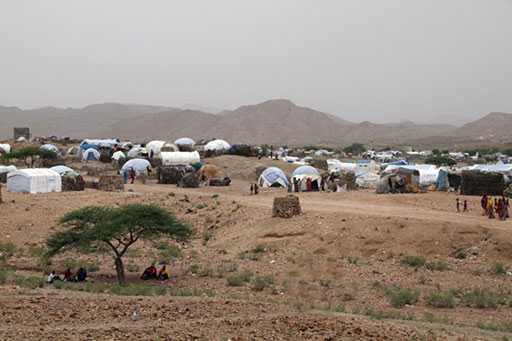
Wednesday, November 21, 2012
By Harbi Abdillahi Omar

Originally built to house 7,000 people, Ali Addeh refugee camp in Djibouti now holds about 20,000 refugees, many in makeshift tents. [Harbi Abdillahi Omar/Sabahi]
The situation for refugees in Djibouti remains precarious. Lack of drinking water, recurring droughts, malnutrition and food shortages make their integration process difficult, according to Aden Hassan of the Ministry of Interior's National Office for the Assistance of Refugees and Displaced Persons (ONARS), which manages the camps.
The Ali Addeh refugee camp, currently the largest refugee camp in Djibouti, opened its doors in 1991 after Somalia's central government collapsed. It was built to accommodate 7,000 refugees, but currently holds about 20,000.
By December 2013, the United Nations High Commissioner for Refugees (UNHCR) estimates there will be more than 30,000 refugees living in Djibouti.
In an effort to relieve the congestion, UNHCR and ONARS asked the government to re-open the Holl-Holl camp, which closed in 2006. It re-opened in June 2012 and now hosts more than 1,000 refugees.
Although some refugees in Djibouti say they want to return home once their countries stabilise, many would prefer to relocate to a third country. So far this year, UNHCR has helped 225 refugees relocate to the United States, Sweden, Canada and other countries, up from 117 in 2011.
About 90% of the country's refugees are from Somalia with the remaining coming mostly from Eritrea and Ethiopia.
Refugees recount difficult living conditions in camps
Abdi Maalin, a Somali refugee in his 30s, has been staying at the Ali Addeh camp for five years. He told Sabahi that even though al-Shabaab has been weakened, Somalia is still unsafe and he hopes to benefit from the relocation programme.
"Today, I am unable to continue my university studies and I cannot work in Djibouti because I do not have any papers," Maalin said. He said all the adults in the camp suffer from unemployment and a lack of income-generating activities.
Omar Idleh, an adviser at the Ministry of the Interior, said there is a need to increase the number of immigrant reception centres and to train mobile units to better deal with immigrants in distress.
"Our country faces a rising tide of migrants flooding in from the border regions of our immediate neighbours in an attempt to reach the Arab peninsula, which they see as an El Dorado, even though in some cases it may cost them their lives," Idleh told Sabahi.
"Their presence on our soil is a heavy burden that brings its share of pollution, deterioration and squalor affecting the safety and environment of the whole country," he said.
Amina Youssouf, 42, a widow and mother of three who has spent 10 years in Ali Addeh camp, said she will relocate to Canada in 2013.
"Today, I have no one in Somalia," she told Sabahi. "My loved ones are gone or have left the country. So why risk my life and those of my kids by going back?"
She said life in the refugee camps has been a struggle beyond the lack of electricity and water shortages. "My children have had no education because the primary school in Holl-Holl was just built in September and the one in Ali Addeh is only four years old," she said.
Even if there had been schools, she said, she did not have the necessary identity papers to enrol her children.
"It was only in May that the UN Children's Fund introduced birth certificates for newborn babies, and the prefecture in Ali-Sabieh, which covers the two refugee camps, introduced birth certificates for refugee children aged less than four months, with additional rules to cover those over four months old," she said.
Illegal immigration also a hazard
Djibouti's location on the Red Sea and proximity to the Middle East also makes illegal immigration a main concern for Djiboutian authorities.
Although Djiboutian law allows refugees to work in the country, the high unemployment rate and the local food crisis do not favour integration, ONARS Deputy Director Aden Hassan told Sabahi. "It is mostly young people and long-term refugees who turn to illegal immigration because of lack of training and education and because of difficult living conditions."
In August, UNHCR reported that the flow of refugees and migrants from the Horn of Africa to Yemen hit a record total of more than 63,800 in the first seven months of 2012, a 30% increase from the previous record in 2011, when a total of 48,700 refugees crossed.
One in six refugees who crossed were Somali while most others were Ethiopian. The vast majority of refugees cross from the Djiboutian port town of Obock, UNHCR said, with the remainder coming from the Somaliland and Puntland regions of Somalia.